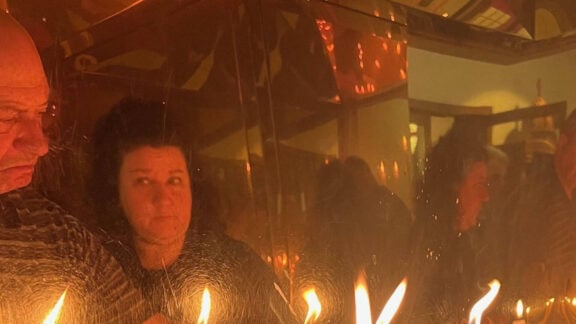After 83 years, 18 victims of Nazi executions from the Cretan town of Adele during WWII have been identified, including the father of the late Archbishop of Australia Stylianos.
A DNA analysis was performed for the first time in Greece’s history on victims of Nazi executions in an initiative supported by musician Eric Alexandrakis’ family.
The study revealed that among the 18 victims was also the father of Australia’s former Greek Orthodox Archbishop Stylianos Harkianakis.
The late Archbishop, who served in the role from 1975 until his death in 2019, spoke openly about his grief over his father’s execution, who was one of many civilians to be killed by the Nazi forces following the Battle of Crete.

The victims, who were all between the ages of 16-67, were made to march to a secluded area among the olive groves, ordered to start digging, were shot on site, and then buried in a mass grave, only to be found two weeks later.
All 18 victims were recognised in a ceremonial commemoration with surviving family members present on 2 June, exactly 83 years on from their tragic deaths.
The study was the result of a collaboration between Dr. George Alexandrakis, from the University of Crete, and the Foundation of Technology and Research [HTE].
The Alexandrakis family had a keen interest in the DNA analysis, given that four of the individuals executed were relatives of theirs.
Dr Alexandrakis, who grew up and was friends with Archbishop Stylianos, led and sponsored the effort to identify the victims.

“Our most sacred oath in Crete is taken on the bonds of our ancestors. I object fundamentally to the inhumanity of mass executions, an act which denies people their identity,” he said.
Dr Alexandrakis acted as one of the main organisers from the University of Crete, and founder of its physics department, with the scientists who conducted the DNA analysis also university employees.
Eric Alexandrakis addressed the personal significance of the study to his family as the massacre took the lives of his great-grandfather, grandfather and two uncles.

“It has been an interesting journey watching the progress, holding the bullets, watching my father unknowingly looking at his grandfather’s wallet and the money in it, and even helping one of the scientists handle the remains,” the musician said.
The DNA analysis aims to bring closure to an 83-year-old wound while also creating awareness of the many forgotten injustices that have taken place, not just in Greece, but around the world.








